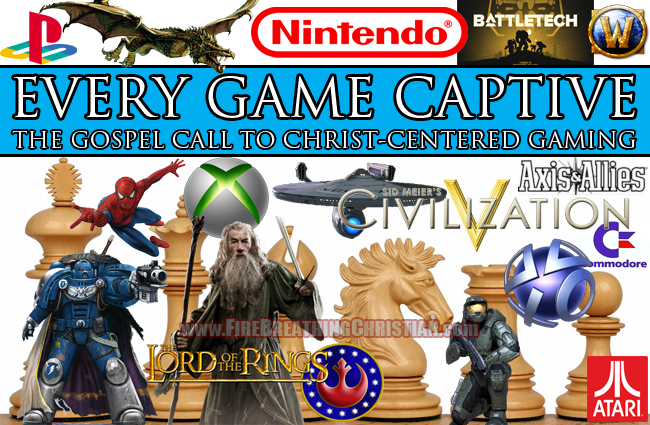
[While this is a post on the subject of gaming from a Christian worldview perspective, it’s gonna take a bit longer than usual to get to where the rubber meets the road on this one. Before we get there, we need to kick around some relevant biblical concepts and dig into several key reference points in Scripture. That said, thank you for your grace, patience and interest.]
My wife Holly and I have recently begun teaching our sweet little Rosie a new concept by encouraging her to learn a new term.
The term is: Theologically unsound.
Since Rosie’s only two, she doesn’t yet understand much about the idea we’re trying to instill, but she is dutifully repeating the phrase with a smile and learning to use it as directed. The direction in question encourages her to think of anything that is wrong, bad, or sinful as inherently being theologically unsound.
The idea is simple (even if the term is a bit heavy and something she’ll have to grow into):
Anything in God’s creation that is really and truly “off” in any way – having been corrupted, perverted or distorted through sin – is inherently a representation of unsound theology because it is, in some way, in disharmony with the Nature of God, which defines all of reality. In other words (and on the flip side), in order for a thing – anything – to be truly and completely sound in the rock-solid sense anywhere in God’s creation, it must be completely theologically sound, and in order to be completely theologically sound it must be in complete harmony with the Nature of God.
Every sinful crack or weakness in any person, action, thought, concept or thing in God’s creation is a manifestation of unsound theology. It’s a demonstration of unbelief. It’s an example of rebellion against reality – the unbreakable reality that everything in God’s creation is defined and constrained by His Nature.
So when Rosie disobeys Holly or hits her little brother Wolfgang or sins in any other way, she is being, among other things, theologically unsound.
She is doing a theologically unsound thing.
Pouting at Mommy is theologically unsound. Hitting Wolfgang or swiping a toy from his hands is theologically unsound. Disobeying Daddy is theologically unsound. All sin is theologically unsound.
Covetousness is theologically unsound. Theft is theologically unsound. Murder is theologically unsound.
And why?
Because they contradict the Nature of God.
How we approach things – any and all things – and determine what is right or wrong about them is both directly impacted by and a direct reflection of our understanding of the Nature of God.
The more accurately we understand the Nature of God, the more accurately we will identify what is right and wrong in His creation.
The more accurately we embrace the Nature of God, the more naturally we will replace our sin-enabling fear of the world and the worldly with a life-enabling, Great Commission-fueling fear of the Lord.
What we’re hoping Rosie will learn by attaching the “theologically unsound” tag to corrupted things or wrong actions – and what I’m hoping that Holly and I will learn better as we try to train Rosie – is that sin is not just “doing something bad” or “wrong”. It’s much more and much bigger than that.
Sin is, at a most fundamental level, the denial of the Nature of God in practice, and things left tainted by sin (unreconciled and unrestored through the application of the Gospel) are left in a condition of unsoundness – theological unsoundness. This unsoundness – this disharmony with God – makes them dangerous and destabilizing to anything they touch.
So the idea is to help Rosie (along with Holly, Wolfgang and me) to better understand that everything touched by sin and left unreconciled through the Gospel exists in a fundamentally and terminally unsound condition, and that unsound condition is directly related to the manner in which the thing in question contradicts the Nature of God.
But the idea doesn’t stop there.
Not even close.
The good part – no, scratch that; make it the most supernaturally supercool part – is that God’s people have been given the power, by His grace and through His Spirit literally living within them(!) to lovingly confront and correct every bit of theological unsoundness to be found anywhere in His creation.
Consider the following crystal clear, everything-touching nature and purpose of the work of Jesus Christ:
He is the image of the invisible God, the firstborn of all creation. For by him all things were created, in heaven and on earth, visible and invisible, whether thrones or dominions or rulers or authorities—all things were created through him and for him. And he is before all things, and in him all things hold together. And he is the head of the body, the church. He is the beginning, the firstborn from the dead, that in everything he might be preeminent. For in him all the fullness of God was pleased to dwell, and through him to reconcile to himself all things, whether on earth or in heaven, making peace by the blood of his cross.
~ Colossians 1:15-20
Even if you’ve already heard or read that passage a thousand times before, please pause to let it soak in.
Bask in its awesomeness.
Think about what it means…and what it means is everything to everything in all of creation!
Now let’s consider how Scripture makes plain that Christ – through His body on His earth – is even at this very moment going about the business of accomplishing His mission to “reconcile to himself all things” by His grace and for His glory through His perfect use of His Spirit-filled people:
We destroy arguments and every lofty opinion raised against the knowledge of God, and take every thought captive to obey Christ
~ 2 Corinthians 10:5
Every thought captive.
Every thought.
Let that one soak in deep, too.
And remember all the while: Taking “every thought captive” inherently yields every action – as in every physical action taken by physical people in the physical world – because every physical action is preceded by thought (well, it oughta be, anyway).
So we as God’s Spirit-filled people (and remember, that means that God the Spirit – the third Person of the Trinity – is literally living within us) are both commanded and equipped to take every thought and every action everywhere in God’s physical creation captive to Christ in accordance with His Gospel-fueled Great Commission:
And Jesus came and said to them, “All authority in heaven and on earth has been given to me. Go therefore and make disciples of all nations, baptizing them in the name of the Father and of the Son and of the Holy Spirit, teaching them to obey all that I have commanded you.”
~ Matthew 28:18-20
Every thought means every thought.
Every thought means every political thought, every legal thought, every economic thought, every artistic thought, every scientific thought, every technological thought, every culinary thought, and every other kind of thought.
And every action is inherently taken captive to Christ when every thought is taken captive to Christ.
So, just to be perfectly clear and connect every dot here, this means that every thought, every action and every thing is to be totally and completely taken captive to King Jesus.
Get it?
Got it?
Good.
This is where we come back to what Holly and I are trying to teach little Rosie about both the fact of sin-touched things being theologically unsound and the necessity of God’s people going about the business of restoring the theological soundness of sin-damaged things by the power of the cross through the Gospel-fueled Great Commission.
This Christ- and Gospel-centered worldview and way of life sees everything that has been corrupted as being a target for reconciliation and restoration.
And again, everything means everything.
Politics, law, civil government…
Economics, business, science, technology…
Art, sports, language…
Each and every area of life in God’s creation is being reconciled to Him by the power of His cross.
But most American Christians don’t think that way, do they?
Nope.
Not even close.
And they haven’t thought that way for a very long time.
These days, the most common American Christian approach to battles raging on the cultural battlefields in the realms of art, science, literature, and pretty much everything centers mostly on running away and hiding. The modern American Christian approach to culture has been to preemptively surrender it to the enemies of Christ and then, after generations of this approach yields the predictable (and biblically assured) results, use the recent stretch of (Christian fear- and apathy-enabled) cultural collapse as evidence of the inevitable, undeniable victory of Satan here on planet Earth.
Talk about a self-fulfilling bad prophecy.
Yet it holds sway over the majority of professing conservative Christians in America, who still overwhelmingly believe that the Devil owns the realms of art, literature, film and the like here in “the real world”, and therefore, though many would never quite admit it as clearly as this, there’s no real point or value in pouring our God-given time, talent, treasure and passion into the wide spectrum of things that comprise human culture and civilization.
Which is why we have the culture that we do now.
Christians are not least responsible for the rot and wreckage smoldering around us. We are most responsible.
(For more on this, please read The True Gospel Conquers Everything; The Modern American “Gospel”…Not So Much, Being supernaturally optimistic in a naturally pessimistic world, and What if we are living in early Church history? Also consider checking out the comics Encouragement from Satan and Obey Your King.)
Shrieking like a scared little girl and scurrying off to hide in the deepest corner of the most comfortable cultural ghetto in sight isn’t exactly a solid strategy for winning the war for the culture in question, so we shouldn’t be surprised that as we’ve engaged (or retreated from engagement with) culture and civilization in this way when it comes to art, literature, science, and technology – to name but a few critical areas of significance – we have only watched those realms plunge deeper and deeper into darkness, doing all that they can to take the rest of the world down with them.
This is the context in which we are addressing the topic of gaming from a Christian worldview perspective.
article continues below
When it comes to film, music, literature and art, Christians in America and the West have become stereotyped (and for the most type accurately so) as the frightened little girl sort mentioned earlier. We’re known for beating a hasty retreat from every field of battle in these realms, shrieking in terror as we go, and many of the Christians who do dare enter into these arenas end up producing very weak, low quality product due in large part to their very weak and very shallow (if not outright flawed) theology. So it is that “Christian art” has become a synonym for “bad art”, lame music, poor literature, and unwatchable films. (For more on this, please read Christian arts, public restrooms, and how the pursuit of excellence got “Left Behind”.)
In this context and making matters even worse, the few semi-recent examples of culture-shaping excellence in the arts from a Christian worldview perspective are often reflexively condemned as evil to the core by professing Christians. While there are certainly legitimate grounds for discussion, critique and debate where things like The Lord of the Rings and The Chronicles of Narnia are concerned (and we always need to respect and accommodate such reasonable dissent), there are many Christians who have become conditioned to auto-trash anything with a dragon or something “magical” in it.
This is how we’ve ended up with things like Left Behind reboots competing with Star Wars: The Force Awakens for the hearts and minds of millions seeking to better understand and interact with the world (and its Maker) through art.
This seems like good point at which to consider a principle that Christians ought to learn to apply to all things, certainly including the arts and related items like games, which are themselves often times rooted in fantasy or sci-fi constructs. The principle in question is that all good things in God’s creation are only good insofar as they accurately reflect His Nature. This then also means that as sin (disunity with the nature of God) is identified and purged from a thing, that thing inherently becomes better (more Christ-like and God honoring). So it is that any thing that can be separated from its corrupting (sinful) elements or attributes is a thing that we as Christians are to be about the business of purifying.
This includes gaming.
Three specific areas in which we will aim to apply this principle to gaming are motive, purpose, and presentation:
- Motive – As Scripture makes plain, the motive of one’s heart is critical (see: Matthew 15:18 and Luke 6:45). Motive is everything, and only the saving grace of God in us can provide us with the pure motives necessary to pursue truly Christ-centered actions. When we pursue things from a Christ-centered motive, we will inherently strive to better know and more accurately conform everything that we think, do, and touch to His Nature as revealed in His Word.
.
In this context it is vital to ask (and continue asking as we go along) the question: Why am I doing this? Why am I making or watching this movie? Why am I writing or reading this book? Why am I creating or playing this game?
.
We need to earnestly seek the truth in these vital matters of motive. We must pray without ceasing for guidance and clarity along the way, knowing that even an adventure begun with pure motives can slide off the tracks into self-serving, sinful pursuits when we allow our eyes, hearts or minds to stray.
.
As for specific games, it is important to note that we are not constrained by what we may think (or even know) about the motives of those who crafted the particular game that we might be considering or playing, and we should not constrain others in a similar fashion. The fact that a particular game may have been made by unbelievers for self-serving, Christ-dismissing reasons in no way renders the game “untouchable” to us or irredeemable as a potentially profitable means by which God’s true Nature might be well observed and contemplated. While some games may require more filtering and adjustment than others, we should be slow to write any game off as a total waste of time or as an irredeemable piece of junk.
.
That said, we must always be mindful of the whole context of any given situation. For example: Immature Christians (those with weak or shallow theology) or those prone to particular temptations associated with any particular game ought not be encouraged to engage with them until their theology deepens and they sufficiently mature. Immature Christians and people with weak or even rotten theology cannot be expected to rightly understand, much less appreciate or apply, the essential component of a biblical motive in gaming. In order to rightly assess the motive(s) of a game’s creator and appropriate correct them by any means available (we will cover this more later), one must have a firm biblical foundation from which to work.
.
There isn’t (and will never be) any way around that.
.
Christians must pursue and achieve a measure of spiritual depth and maturity before they will be able to rightly understand gaming.
.
This might seem counter-intuitive, especially in light of passages like 1 Corinthians 13:22, which reads: “When I was a child, I spoke like a child, I thought like a child, I reasoned like a child. When I became a man, I gave up childish ways.”
.
To assume that this passage is directly aimed at things like games is not only baseless, but backwards, and dangerously so.
.
The passage in which this verse appears makes it plain that it is not addressing “childish things” like games or toys. It’s addressing the childishness of our simple, small view of things on this side of eternity. It’s addressing how we see things so dimly from our flawed, fallen human perspectives.
.
A childish Christian worldview is a worldview in which the Gospel is very small and limited. In contrast to this childish condition, thinking like a mature Christian man or woman inspires awe and a sense of great purpose at the revelation that everything belongs to Christ and is being reconciled to Him even now by His grace through His People pursuing His Gospel-fueled Great Commission, and that of the many amazing things made to reveal and revel in the Nature of Christ in His creation is the creation of gaming.
.
This mind-blowingly beautiful reality should be the core upon which we strive to settle and secure our motive in all gaming related pursuits.
.
With this critical concept embraced, let’s move on to a discussion of purpose in gaming…
. - .Purpose – The purpose of gaming is obviously intertwined with the subject of motive, but is worthy of distinct consideration, especially for those on the creative side of things (those who make games or make things in games). What is the purpose of the story, the film or the game? What is it’s overarching worldview pitch? And arguably of most importance is the question as to what makes the film, book or game profitable? What, if anything, are we learning by reading, watching, crafting or playing that is truly helpful and productive?
.
Consider the following:
“All things are lawful,” but not all things are helpful. “All things are lawful,” but not all things build up.
~ 1 Corinthians 10:23
So the fact that we can do something doesn’t necessarily mean that we should be doing it.
We want to spend our time, talent, treasure and passion as wisely and as productively as possible, not out of some dry, legalistic, fun-sapping obligation, but out of a love for the Lord and a faith that inspires us to trust His promise that such pursuits are the best things for us.
It’s this truth that should motivate and inspire us to happily and eagerly seek out and pursue activities, hobbies, and projects that are not merely lawful – meaning there’s nothing inherently wrong with them – but are also actually profitable – meaning that they promote our growth and development. Contrary to the views of many who have taken the “run away and hide in the ghetto” approach to things like gaming, there is often great (and a great variety of) such profitable value to be found in games.
Let’s consider this notion of value or profitability for a moment in eight (often overlapping) categories:
- Learning – Both as a player and a game designer, games offer great opportunity for learning and sharing what we learn about the Nature of God as revealed in His creation. Strategy, tactics, aesthetics, sportsmanship, competition, logic, mathematics and any number of other common attributes of games each offer valuable insight into the matchlessly beautiful mind and nature of God. It’s our job as Christians to guide and nurture these and other game attributes in a manner that accurately conveys the Nature of God. By confronting and correcting theologically unsound aspects of games when we find them, we cultivate theological soundness in those games, and thereby in God’s creation.
.
That, my friends, is a beautiful thing!
. - Training – Where there is learning, there is training. While some transitions from one to the other are not so obvious, many times they’re glaring. One example of the latter would be the flight simulators – which are flight simulation games – that are used to train everything from airline pilots to Astronauts at NASA. The truth is that every game is training its players in some way. This makes them great tools for either the proliferation of theological soundness (harmony with God) or theological unsoundness (disharmony with God). Our job in the realm of gaming is to be about the business of molding games into tools of training that accurately and honestly present God’s nature as revealed in His Word. This is a perpetual reformation and refinement process that, like so many others, will go on and on from one level of success to another as we learn, grow and see things more and more clearly as the Spirit of God works within us. By making games that train people to better understand, appreciate, and apply the Nature of God in any and all areas touched upon, we provide an enjoyable and approachable tool by which image-bearers of God may grow to know and love Him more.
.
That too is a very beautiful thing!
. - Modeling – The more accurately we are able to model any aspect of God’s creation, the better we will understand it and the more we will appreciate Him through it. This principle finds itself on display in many ways in various games, from literal physical miniatures of people, creatures, buildings and terrain on the tabletop battlefield of a war game to the deep study and analysis involved in accurately rendering trees, animals and other characters in an online or video game.
.
Predictive modeling is another type of modeling with great value. The better we become at modeling things like weather patterns or the wear and tear of equipment in certain environments, the more accurate (and therefore more helpful) our models will become in assisting us to prepare for anything from oncoming storms to far-flung adventures in challenging environments. The savings in both time and resources made available through such modeling can provide a great boost to the practical advance of civilization.
. - Strategy – Strategic thinking is vital, and gaming can be an excellent tool for honing one’s ability to identify and apply sound strategy. The allocation of resources, prioritization of objectives, and composition of contingencies are regular features found in a wide range of games.
. - Tactics – Understanding the difference between strategy and tactics is one thing. Competently composing and applying sound tactics in support of a strategic goal or objective is another, and the realm of gaming once again offers many excellent tools for acquiring this understanding and refining its application.
. - Team Work – Many games provide excellent opportunities for cultivating and applying sound principles of team work.
. - Craftsmanship – Whether we’re talking about game designers or those who craft strategies, products or other things within the games themselves, the ability to pursue and display quality craftsmanship in games offers great opportunity for teaching and learning lessons that are very helpful in “the real world”.
. - Aesthetics – What is beautiful? What is ugly? What is hideous? And how can the purposeful use of all three categories be used to properly and profitably illustrate and highlight the attributes of God? Aesthetics is something that we will explore much more in the following section (on the importance of presentation in gaming), but it’s worth noting aesthetics here as an area of great value that is often addressed (sometimes well; often not so well) in many games today. The power and purpose of aesthetics is something that Christians must master, and gaming offers a wonderful opportunity to train, learn, and model along those lines.
Lord willing (and crazy schedule permitting), we’ll roll into Part 2 sometime in the not too distant future (featuring a lot of real game specific examples), where we’ll begin by heading into the topic of presentation in gaming.
In the meantime, please soak in and contemplate the supercool fact that every game is telling us many things about God….and it’s our job to be sure that those things are true.
If you know of anyone who might appreciate this post, please share it. If you’d like to see articles like this continue, please click here to help.
Please also “like” us on Facebook, “+” us on Google+, follow us on Twitter and feel free to sign up for new articles by email using the buttons in the upper right corner of the FBC home page.
Please check out The Fire Breathing Christian Podcast too, as well as the latest designs at Fire Breathing Tees and the latest memes at the Fire Breathing Memes page.
You can also help support the Fire Breathing Christian mission by checking out these books:
The Beginning of Knowledge: Christ as Truth in Apologetics is an approachable, easy to read introduction to Christ-centered apologetics:
 _____________________________________________________
_____________________________________________________
Apathetic Christianity: The Zombie Religion of American Churchianity explores the tragic true horror story of all-American dead religion masquerading as Christianity:
_____________________________________________________
On Education is a compilation of some of the most provocative and compelling Fire Breathing Christian articles on the subject of children’s education:
_____________________________________________________
There Is No “God-Given Right” To Worship False Gods is a compilation of some of the most provocative Fire Breathing Christian articles on the subject of America’s embrace of a satanic approach to religious liberty:
_____________________________________________________
Fire Breathing Christians – The Common Believer’s Call to Reformation, Revival, and Revolution is the book that first presented the FBC mission to apply the Gospel-fueled Great Commission in every realm of God’s creation:
_____________________________________________________
An alternate white cover version of Fire Breathing Christians is available:
_____________________________________________________
There is also an alternate black cover version of Fire Breathing Christians:
Finally, here are a few good intro/reminder links for those of you who are new to Fire Breathing Christian and curious about exactly what’s goin’ on ’round here:
What are you, some kind of [insert label here] or something?!
What’s with that shark-fishie graphic thing?
Intro to Fire: The Power and Purpose of the Common Believer
When the Bible gets hairy. (Or: Is it right for men to have long hair?)
And especially this one: Never forget that apart from God’s grace you and I are complete morons.
Thank you for your support!












Great article. Will there ever be a part 2?
Thanks for the kind words, Mike. I may try to do Part 2 soon in the form of a podcast/video combo. I also might tackle the long delayed Part 2 for my Star Wars article the same way.
Laura Lee,
While I agree with you that we should teach our children to only obey God without question, I think that's a lesson for a bit later on. A two year old does not have the required knowledge and maturity to accurately filter whether or not what their parent is asking them lines up with God's will. How do they even know what God's commands are at that point except that their parents tell them so by teaching them? If little Rosie is disobeying at 2 years old, I guarantee she's not thinking, "hmm Daddy told me to do something God wouldn't want me to do, I better disobey!" A little bit down the road, then the time will come for the lesson about "now Rosie, if anyone, including me, ever tells you to do something you know God wouldn't like, who are you going to obey? That's right, God!"
On a different note, please, please, please do part 2 of this post soon! This is such a huge issue these days!
Thank you for the article. Usually agree with you… most of the time… yet, we are a body and we are to be the body.
The scripture says to be meek when addressing a brother one at least believes is overtaken in a fault. Knowing, we are all the same in that we all have faults.
So, I'll just speak my thoughts and I apologize if it is not gentle or meek enough… that would be my fault if so! 🙂
She who lives for pleasure is dead while she lives. Gaming is not a Christian discipline of those dead to the flesh. It is entertainment driven and is a work of the flesh. Gaming is not of God. It's just not. Entertainment is not of God… and I understand that you do not agree.
Please pray. It is something to pray regarding.
None of us is perfect. I'm not. Not everything I do is of God. Yet, I don't say it is of God when it is not… it's just that we are not perfect and we… seek out our own devices… we seek out our own inventions… this is not of God… nor is entertainment.
Yet, as Romans says, do I do the same things? Yes. Am I fit to judge you on this? No.
I'm just sayin'… :)… as a fellow sojourner in this world not of it… with sin in my flesh too!
Also, your daughter is not in the flesh automatically when disobeying you. That too is pride speaking and is not right. Would you attend a church where the pastor said that to obey him is to obey God and is theologically sound automatically? I hope not. It would be a cult.
You see, whether a pastor or a father… it is the same. You are a shepherd under the Shepherd and it is His flock and we are His first. And parents can become cultish in their roles as parents… even as a pastor in a church can. It is the same job in a different manner of speaking. And the same errors apply.
It is the Word that determines whether you are right or wrong. You are not an authority in and of yourself in an office… as father… or pastor… or anything else.
And it is dangerous and prideful to take that position. Humility says that you can be wrong and your daughter can be more spiritual than you are.
Jesus Christ was expected by His parents to leave Jerusalem with their company. He stayed behind in Jerusalem.
His parents thought that was wrong. Jesus did what was right. Obeying His Father was greater than obeying His parents in this life.
Should we obey man or God?
The Pharisees thought they should be unilaterally obeyed.
Only God should be unilaterally obeyed.
Anyone who expects anyone should unilaterially obey him or her is in the flesh in pride and it is taking the place of God in pride.
Just a word.
Love in Jesus,
Laura Lee